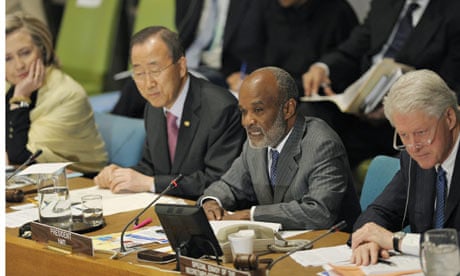Donors will today pledge billions of dollars for aid to Haiti, with the emphasis on working through Haitian state institutions rather than aid agencies.
About 120 countries and international organisations will meet at the United Nations in New York to agree a recovery plan following the January earthquake which devastated the capital Port-au-Prince, killing more than 200,000 people and leaving 1 million homeless.
Haiti's president, René Préval, will request $4bn (£2.6bn) over three years, including $1.3bn for humanitarian relief over the next 18 months. The recovery plan includes decentralisation and building up anaemic agriculture.
The total quake damage to the Caribbean nation, the western hemisphere's poorest, is estimated to range from $8bn to $14bn.
The European Union and a coalition of US-based humanitarian groups have signalled pledges of more than $2.7bn for relief and reconstruction efforts. President Barack Obama has asked the US congress for $2.8bn. The US effort will focus on agriculture, energy, health, security and justice.
Donors said the bulk of funds would be funnelled through the Haitian state – known in aid jargon as capacity building – rather than the myriad aid agencies and non-governmental organisations which operate in Port-au-Prince.
Pre-quake aid traditionally skirted Haiti's state because of corruption and inefficiency but that stunted the government, trapped the country in a cycle of dependency and left poverty unresolved.
"The international community is co-responsible for [the] weakness of Haitian institutions and the Haitian state," said Edmond Mulet.
"We've always worked not with the government or through the government, because it has been too corrupt, too weak. But if we don't address the situation we will have a peacekeeping mission in Haiti for the next 200 years."
Robert Zoellick, head of the World Bank, said donor money should flow through the Haitian government budget – with monitoring to minimise waste and corruption.
"This time we have a chance to do things differently but it requires a partnership for the long haul," he told Reuters. "This will require a commitment on both sides – for the Haitian authorities but also for the donors. On the side of the international agencies we need to co-operate, not complicate."
The donor conference – chaired by Hillary Clinton, the US secretary of state, and Ban Ki-Moon, the UN secretary general – will flesh out the Interim Haiti Recovery Commission, an initial 23-member body tasked with co-ordinating aid flows. It will be co-chaired by Bill Clinton, the former US president-turned-UN Haiti envoy, and Jean-Max Bellerive, Haiti's prime minister.
